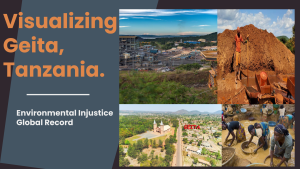Visualizing Geita
xxxx

xxxx

The article discusses the "compassion protocols" of France, the laws that allow illegal immigrants to stay in the country and get treated for diseases. They will not be deported and if they are incurable, then their housing costs will be paid for. It brings up politics that are very different from that in America, as far as what people are entitiled to. To be allowed to stay, one must apply to the government and wait to be accepted or denied. In cases of doubt, the individual was supposed to be accepted.
Preston's article mentions the EPA still had not formulated and enacted a plan for cleanup-- it should be noted the year of publication was 2006. She claims "After an expert panel failed last year to settle on a method for organizing an E.P.A. cleanup, the agency said it would proceed anyway with limited testing and cleaning". Moreover, in the 10 years since publication, several studies have indicated increased public health risks and chronic illness prevalence in populations near the disaster zone. It seems the approach of sit-and-wait did nothing but exacerbate the issue, leading me to believe this will serve as a symbol in any future pollutant-laden disasters.
The study does utilize a fairly new perspective to gather information. This study as a whole appears to work both as a review article and present information gathered through the subjects interviewed. The first portion of the article presents the various factors being considered in the provided services (for example, why some rape cases are thrown out at a community level, and what characteristics of sexual assault influence social system response). The second portion utilizes interviews with a national, random sample of victim advocates. The selection process ended with 177 eligible agencies for questioning, and 168 participated in the interview process. As mentioned in the introduction of the report and in a previous answer, this large scale study is contrary to usual methodologies. Victim services are typically examined within a small context (i.e. how many alleged rape cases brought to a detective are pursued or how many alleged rape victims who present for counseling receive this help and what is their progress). This study took all of the levels of service (legal, medical, and mental health) and viewed their effectiveness as a network.
The information in this study can be used to offer help to couples after disasters, as it shows that counseling may be needed to help aleviate some of the issues at hand. While counseling may not be readily available with all of the other disaster relief that is going on, it should be reconized as something that may be necessary to help the recovery process and ensure greater safety.
At this point, no. The program seeks to remedy failings within the prison health care system. Health care professionals who provide treatment and services are licensed physicians, nurses, residents, or current medical students.
The founding members were Bed-Stuy residents Captain James "Rocky" Robinson and Specialist Joe Perez. Since then, membership has extended to other EMS personnel, the majority of whom are also Bed-Stuy residents. This is also the first multi-cultural ambulatory agency and seeks to provide meaningful careers to Bed-Stuy residents
Emergency response is discussed in the following quote:
"One such intervention, psychological debriefing or critical incident stress debriefing, was developed in the 1980s for emergency responders and has been used with other victims of trauma (46). The technique is applied within 48 h of the traumatic event, during which victims are asked to describe the event and their emotional responses to it in detail. They are also given suggestions of methods to relieve stress (12). Intervention studies, however, have found that this method does not prevent psychopathology and, by strengthening memories of the traumatic event, may impair the natural recovery process and even worsen symptoms (44). Therefore, it is no longer recommended in the immediate aftermath of traumatic event exposure (12, 49)."
This quote shows that the psychological needs of first responders are also considered, not just those of the people who were victims. It shows a weakness in the abilities to heal people afterwards, as this method is no longer recommended. Other methods are being pursued, as the first responders of the world need support and healing too.
None that I'm aware of at this time, nor did Google review any answers. However, this web platform is more than likely modeled after other cause platforms-- areas where documentaries can be viewed and discussed
Artisanal or Snall Scale Mining in Geita.